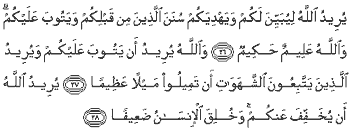Better Substitute, Right and Wrong, Renaissance of Islamic life
Issue 536 » July 3, 2009 - Rajab 10, 1430
Living The Quran
An-Nisa (The Women)
Chapter 4: Verses 26-28
 Better Substitute
Better Substitute
"Allah desires to make clear to you and to guide you to the ways of the [righteous] people before you and to turn to you in mercy; and Allah is all-Knowing, Wise. And Allah desires to lighten your burden, for the human being was created weak."
One of the merits of Islam is that it shows mercy towards people in that whenever it forbids something it provides a better substitute with which to replace it. Islam forbids usury but allows profitable business. Islam forbids gambling, but allows winning prizes in contests of shooting, racing, wrestling, etc. Islam forbids adultery but urges Muslims to marry as soon as they can support a family. Islam forbids drinking alcohol but allows all other good and healthy drinks. Islam forbids what is bad in food but allows what is good and nourishing.
The same principle can be traced through all the teachings of Islam. For assuredly, Allah has no desire to make people's lives difficult, narrow, and circumscribed; on the contrary; He desires ease, goodness, guidance, and mercy for them according to the above verse.
Compiled From:
"The Principles of Halal and Haram" - Yusuf Al-Qaradawi
Understanding The Prophet's Life
Right and Wrong
Sometimes it is beneficial to command, sometimes to forbid. At other times, where right and wrong are mutually inextricable, it is not beneficial either to command or to forbid. It all depends on the nature of specific cases as they arise.
In equivocal cases the believer must seek clarification until the truth becomes obvious to him. For he may not embark upon an act of obedience without knowledge and intention, while if he leaves it undone he is a sinner, since it is sinful to ignore a necessary duty. It is also sinful to do what has been prohibited, however. The implications of all this are far-reaching and there is neither power nor strength except with God.
Under this category falls the concession made by the Prophet, on him be peace, to leading hypocrites and reprobates like Abdullah ibn Ubayy in view of their numerous support. For to have penalized him in some way for his wrong conduct would have entailed the loss of a greater good, through the fury and chauvinism of his tribesmen and through the aversion of people would have felt on hearing that Muhammad was killing his Companions.
Compiled From:
"Public Duties in Islam" - Ibn Taymiyya, p. 81
Blindspot!
Renaissance of Islamic life
No renaissance of Islamic life can be effected purely by law or statute, or by the establishment of a social system on the basis of the Islamic philosophy. Such a step is only one of the two pillars on which Islam must always stand in its construction of life. The other is the production of a state of mind imbued with the Islamic theory of life, to act as an inner motivation for establishing this form of life and to give coherence to all the social, religious, and civil legislation. Social justice is an integral part of this Islamic life; it cannot be realized unless this form of life is first realized, and it cannot have any guaranteed permanence unless this form of life is built up on solid foundations. It is in this similar to all other social systems; it must have the support of public belief and confidence in its merits. Failing this, it will lose its spiritual foundations, and its establishment will depend on the force of religious and social legislation; this is a force that obtains only so long as evasion is impossible.
Hence Islamic legislation relies on obedience and conviction; it depends on religious belief. Thus we must always keep in mind the necessity for a renaissance of our religious faith; we must cleanse it of all accretions, such as alterations and arbitrary interpretations and ambiguities; only thus can it be a support for the necessary social legislation that will establish a sound form of Islamic life. This form of life will depend upon legislation and exhortation, those twin fundamental methods of Islam towards the achievement of all aims.
We must, then, establish our Islamic theory in individuals and societies at the same time that we set up the Islamic legislation to regulate life.
Compiled From:
"Social Justice in Islam" - Sayyid Qutb, p. 285